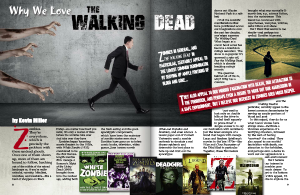Years before I began my career as a screenwriter/filmmaker, I met a guy named Murray Stiller who was hot on the idea of making horror movies from a Christian perspective. I admit to being intrigued, even though the idea struck me as odd at the time. But as Murray made his case, I came to see that horror movies should come as naturally to evangelical Christians as breathing.
Think about it: For many evangelicals, the gospel is a horror story. “Do this thing or else this other bad thing will happen. Forever.” What could be more terrifying than that? And if you really think anyone who fails to become a Christian will spend eternity in hell, wouldn’t you want to make those consequences as explicit as possible? With the majority of evangelicals holding to some form of eternal separation or torment for unbelievers, you’d think every movie house would be a hell house, that every movie night would include a trailer for some new manifestation of A Thief In the Night.
Beyond its utility as a form of psychological manipulation, horror is also one of the few genres that outright embraces the supernatural–a dimension of reality of which Christians are always trying to convince others. Horror films are also inherently moralistic and often outright preachy. Even a torture porn film like Hostel is essentially a meditation on Romans 6:23: “The wages of sin is death.” There’s no need for subtlety when we’re face to face with a potentially violent death at the hands of a crazed killer. We’ll grasp at pretty much anything to save our skins. So rather than be surprised when the occasional attempt at horror movie-making surfaces within the evangelical community, I’m amazed evangelicals aren’t churning these things out faster than the running zombies took over NYC in World War Z.
And yet, when I come across a film like The Lock In–a low budget found footage horror flick about some teenage boys who sneak a pornographic magazine into a youth group sleepover, only to unleash a series of demonic attacks–I am surprised. Because when I think about Christian filmmaking these days, the first names that come to mind are Tyler Perry (Madea’s Family Reunion, etc.) and the folks at Sherwood Pictures (Fireproof, Facing the Giants, Courageous). Then you have the occasional faith-based film made for a mainstream audience, such as the upcoming Heaven is for Real, Soul Surfer, The Blind Side and, most recently, God’s Not Dead. What do all of these films have in common? They’re safe, boring and predictable. Somewhere along the way, Christian filmmaking came to be equated with family-friendly filmmaking. Rather than challenge or provoke their audiences–as all good art should do–these films merely reaffirm the status quo. Unfortunately, with so many evangelicals feeling duty-bound to support their own, no matter the quality of the film, these movies also tend to do rather well at the box office, thus creating a self-perpetuating cycle of blandness. And when someone, like the producers of The Lock In, attempts to break out of that mold, they truly do find the doors to the church permanently barred.
I should probably pause here and acknowledge the handful of Christian filmmakers who have made horror their bread and butter–or at least their toast and jam: Scott Derrickson (Sinister, Deliver us from Evil, etc.), Terrence Fisher (The Curse of Frankenstein and pretty much every other Hammer horror film), Billy Friedkin (The Exorcist) and Kevin Smith (Red State) to name a few. I might even add my own name to this list, seeing as my first film, After…, was essentially a horror flick, even though that’s not quite the movie I set out to write. Then there are the LaLonde brothers with their endless stream of end time thrillers (Left Behind, etc.).
However, Christians–especially evangelical Christians–who dabble in horror are the exception rather than the rule. And apart from the LaLonde brothers, rarely do they make their films for a faith-based audience. More often, you’ll find people like Wes Craven (A Nightmare on Elm Street) or Paul Shrader (Dominion), people who were raised in evangelical homes but have since moved on, working in this genre. Perhaps they do so out of rebellion, but I like to think it’s because they’ve inherited a highly moralistic grid but have lost the inhibitions that came with it, allowing them to explore spiritual questions to a depth their evangelical peers are afraid to go. As Derrickson says, “My feeling is that a lot of Christians are wary of this genre simply because it’s unpleasant. The genre is not about making you feel good, it is about making you face your fears. And in my experience, that’s something that a lot of Christians don’t want to do.”
This has certainly been the experience for the producers of The Lock In. In an email exchange with producer Rick Praytor, he told me that,
It was meant to be kind of a fun, cheesy horror flick (like Sharknado) with the intention of using it to stir conversations about pornography. What we found is that church leaders do not want to endorse a horror film. Most [of our audience] are non-Christian, horror movie buffs who love weird stuff.
If the filmmakers’ goal was to reach non-Christians, perhaps being shut out of the church isn’t such a bad thing. However, I know from experience that raising money for a faith-based film that seeks to reach a broad audience but doesn’t pass the family-friendly smell test is about as difficult as preventing Jason or Michael Myers from coming back for another sequel. This leaves filmmakers like Praytor in a difficult position, because, as he said to me on the phone, he probably should have made the film scarier, in order to give it a broader appeal, but he couldn’t make it too scary or else Christians wouldn’t watch it. As a result, The Lock In falls somewhere in the middle, trying to please everyone but not really pleasing anyone.
That said, I admit to rather enjoying the film. Sure, it’s low budget, cheesy and on the nose in terms of its message. But it’s also a lot of fun with some surprisingly good acting, a great sense of humor and loads of enthusiasm. There are even a couple of good scares. And when you think of the subtext of the film–the idea that being locked inside the church forever is akin to a living hell–I think there’s a lot more going on with this movie than meets the eye. Overall though, I like the movie simply because it took a lot of guts to make.
To quote Derrickson again,
To me, the horror genre is the genre of non-denial. It’s about admitting that there is evil in the world, and recognizing that there is evil within us, and that we’re not in control, and that the things that we are afraid of must be confronted in order for us to relinquish that fear. And I think that the horror genre serves a great purpose in bolstering our understanding of what is evil and therefore better defining what is good. And of course I’m talking about, really, the potential of the horror genre, because there are a lot of horror films that don’t do these things. It is a genre that’s full of exploitation, but the better films in the genre certainly accomplish, I think, very noble things.
Does The Lock In accomplish something noble? I think it does. Most attempts to pioneer something new–or revive something old–are rather crude, but they lay the groundwork for better things to come. So rather than bash this film for its low production values, I’d prefer to congratulate the filmmakers on taking a huge risk and encourage them to give it another go. Even though I don’t necessarily share their theology, unlike many of their evangelical peers, who are bending over backwards to package their message in ways that will render it unoffensive to non-Christians, I respect them for being true to their convictions. You can’t ask anything more than that.











